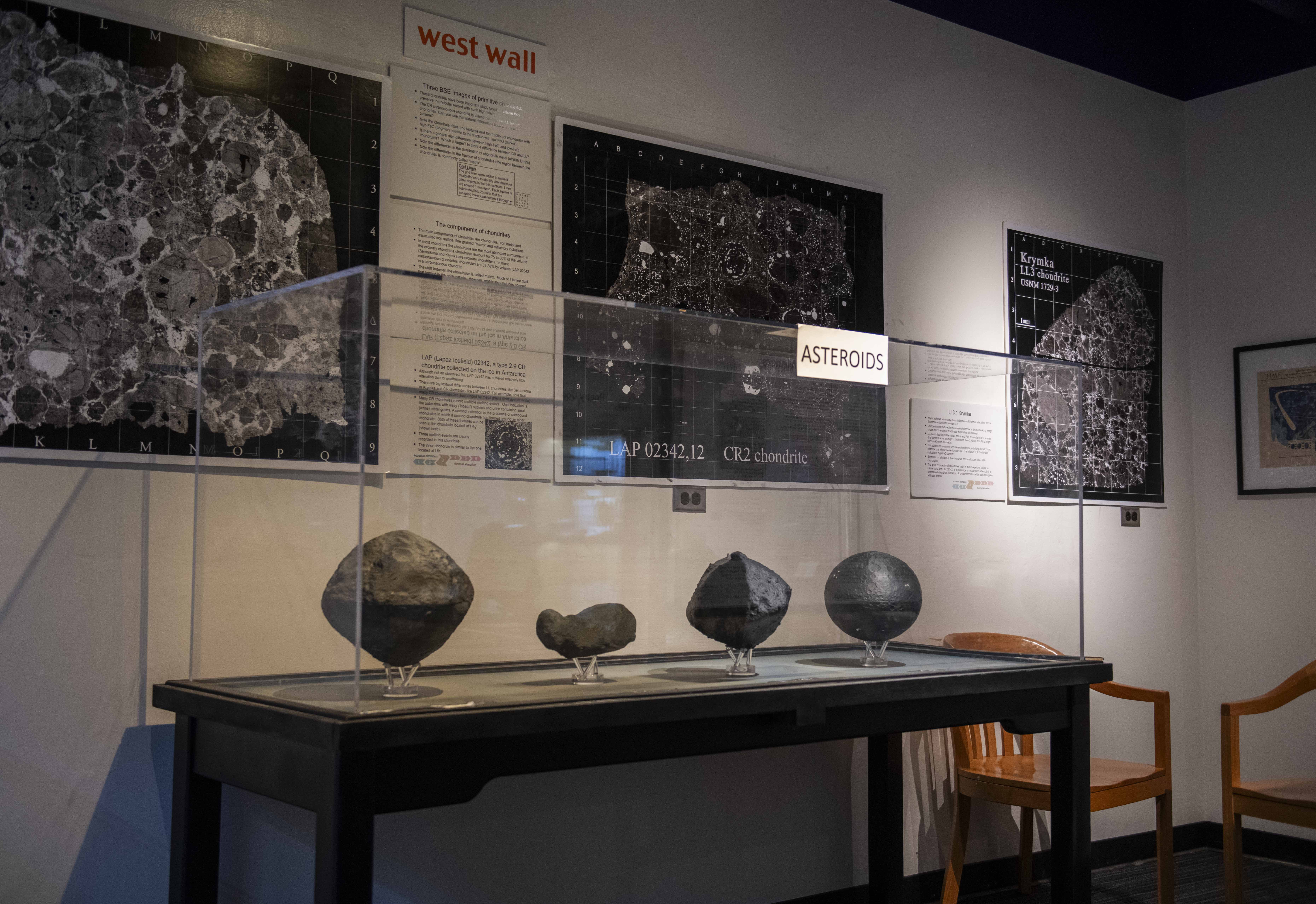Missing meteorite samples from UCLA collection found on eBay listing
Over 1,500 meteorites and celestial objects are housed in UCLA’s Meteorite Museum, the largest meteorite collection on the West Coast. One of UCLA’s meteorites was recently listed on eBay, causing controversy. (Leydi Cris Cobo Cordon/Daily Bruin senior staff)
By Zoya Alam
Feb. 26, 2025 11:45 p.m.
This post was updated Feb. 28 at 2:10 p.m.
Jason Utas has long been in the craft of buying and selling meteorites.
But Utas – a graduate student studying earth, planetary and space sciences – said that in 2022 he found something particularly unusual on eBay, an online marketplace and auction site.
“They were UCLA specimens that were published (written about), and they were turning up on eBay,” Utas said. “It was really weird.”
Utas said he noticed that some meteorites, up for auction by a seller located in Los Angeles, were labeled using the same labeling method as rocks in UCLA’s meteorite collection. He added that he grew suspicious.
“They looked vaguely familiar,” Utas said. “I pulled out the thick section catalog, went through it and found the specimens lists … turns out they (the samples on eBay) were actually the specimens that were written up in that paper.”
Utas emailed the now-retired Alan Rubin, an adjunct professor of earth, planetary and space sciences, who confirmed Utas’ suspicions that the items being sold on eBay belonged to UCLA and said that the meteorites should be returned to the university.
“I recognize the Faucett sections,” Rubin said in an email to Utas. “That large metal nodule is geochemically unique.”
Kevin McKeegan, a research professor emeritus, also joined the effort to reobtain the samples. McKeegan said that the logbooks for the UCLA Meteorite Museum reflected that the rocks were a part of the UCLA collection, and it seemed that they were never returned.

The samples on eBay were loaned to James Chen at the California Institute of Technology in 1997 by former UCLA professor John Wasson, McKeegan said.
When Chen passed away, many of his possessions, the samples among them, ended up in the possession of an estate liquidation company, from which Jared Cicon – proprietor of the eBay store “GONEPKN” – obtained the samples, McKeegan added.
Cicon, using the seller name “1931jared,” then listed the UCLA meteorites on eBay, McKeegan said.
Of the meteorite samples associated with UCLA on Cicon’s page, all were owned by UCLA with the exception of one sample which was loaned to UCLA by the British Museum in London, Utas said. He added that the summed value of the items listed by Cicon was around several thousands of dollars.
McKeegan said he reached out to Cicon through eBay chats, requesting that he return the meteorites to UCLA. Cicon, however, replied claiming he rightfully obtained the samples, adding that he did not feel the need to comply and return the samples until shown proof by UCLA, according to eBay messages between him and McKeegan.
In further emails to McKeegan, Cicon allegedly offered to sell back the meteorites to UCLA but later retracted his offer.
“I purchased them legally. I have receipts for them. I am the legal owner,” Cicon said in an email to McKeegan. “The offer to sell them to UCLA for $600 is off the table. If the investigators need to interview me, please forward my email address to them so they may reach out to me.”
McKeegan said he contacted detectives from UCPD, hoping they could put some pressure on Cicon to return the samples.
Detective Monica Zourek was tasked with the case, according to reports provided by UCLA Police Department Patrol Division Lieutenant James Echols.
“Detective Zourek attempted to contact Cicon, but he refused to give a statement and attempted to give his attorney’s information,” the UCPD report reads.
According to the report, Zourek later decided there was no intent of crime, making the case a civil matter, not a criminal one.
A criminal case is one that violates the California Penal Code and identifies as a crime which litigation can be made against, Echols said. On the other hand, he added, a civil case is a matter of responsibility and must be resolved between the two parties on their own or in court.
Echols added that the police decided that it was not a matter of whether the meteorites belonged to UCLA but rather a determination of whether or not there was intent of crime involved in the act of obtaining and selling the specimens.
The matter could be taken up to the civil court by the individuals involved, but UCPD has no power to order Cicon to return the items, since Cicon claimed he legally obtained the samples through purchase, Echols said.
“We can’t make any demand (to get them returned),” said Echols. “That’s why it’s a civil matter. They (Cicon) are saying that they’re in possession of it rightfully. … It wasn’t proven that there was any intent behind it, thereby making it a crime.”
Utas expressed frustration over not being able to get the samples back, saying that some of the samples are irreplaceable.
“I think it’s crazy that UCLA isn’t trying to get this stuff back,” he said. “It’s research materials. It’s worth a heck of a lot.”
After the futile attempt to gain back the meteorites, McKeegan ended up buying back the sample from the British Museum for $700, Utas said. Many other UCLA samples were sold to other buyers, and some were still up for auction on Cicon’s page until last December.
As of today, UCLA is no longer loaning meteorites and is instead working on raising funds to employ a curator to manage UCLA’s current meteorite collection so such events do not happen again, McKeegan said.
“It was kind of out of our jurisdiction, in a way,” McKeegan said. “We are scientists, not lawyers, and UCLA has other things to worry about, so it was just sort of dropped.”
